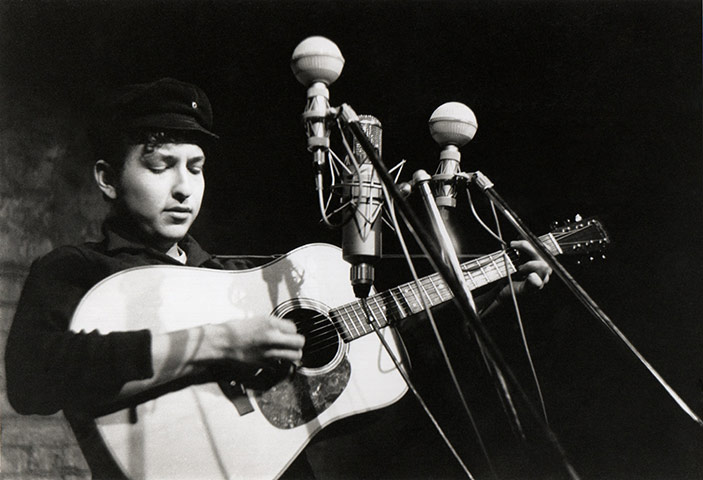Biography

A start
Folk rock singer-songwriter Bob Dylan was born Robert Allen Zimmerman on May 24, 1941, in Duluth, Minnesota. Driven by the influences of early rock stars like Elvis Presley, Jerry Lee Lewis and Little Richard (whom he used to imitate on the piano at high school dances), the young Dylan formed his own bands, including The Golden Chords as well as a group he fronted under the pseudonym Elston Gunn. While attending the University of Minnesota in Minneapolis, he began performing folk and country songs at local cafés, taking the name "Bob Dylan," after the late Welsh poet Dylan Thomas.

Folk singin'
Folk rock singer-songwriter Bob Dylan was born Robert Allen Zimmerman on May 24, 1941, in Duluth, Minnesota. Driven by the influences of early rock stars like Elvis Presley, Jerry Lee Lewis and Little Richard (whom he used to imitate on the piano at high school dances), the young Dylan formed his own bands, including The Golden Chords as well as a group he fronted under the pseudonym Elston Gunn. While attending the University of Minnesota in Minneapolis, he began performing folk and country songs at local cafés, taking the name "Bob Dylan," after the late Welsh poet Dylan Thomas.

Reinventing His Image
In 1965, Dylan scandalized many of his folkie fans by recording the half-acoustic, half-electric album Bringing It All Back Home, backed by a nine-piece band. On July 25, 1965, he was famously booed at the Newport Folk Festival when he performed electrically for the first time. The albums that followed, Highway 61 Revisited (1965)—which included the seminal rock song "Like a Rolling Stone"—and the two-record set Blonde on Blonde (1966) represented Dylan at his most innovative. With his unmistakable voice and unforgettable lyrics, Dylan brought the worlds of music and literature together as no one else had.

Rock Star Status
In 1989, when Dylan was inducted into the Rock & Roll Hall of Fame, Bruce Springsteen spoke at the ceremony, declaring that "Bob freed the mind the way Elvis freed the body ... He invented a new way a pop singer could sound, broke through the limitations of what a recording artist could achieve, and changed the face of rock and roll forever." Dylan's 1997 album Time Out of Mind re-established this one-time folk icon as one of the preeminent of rock's wise men, winning three Grammy Awards.